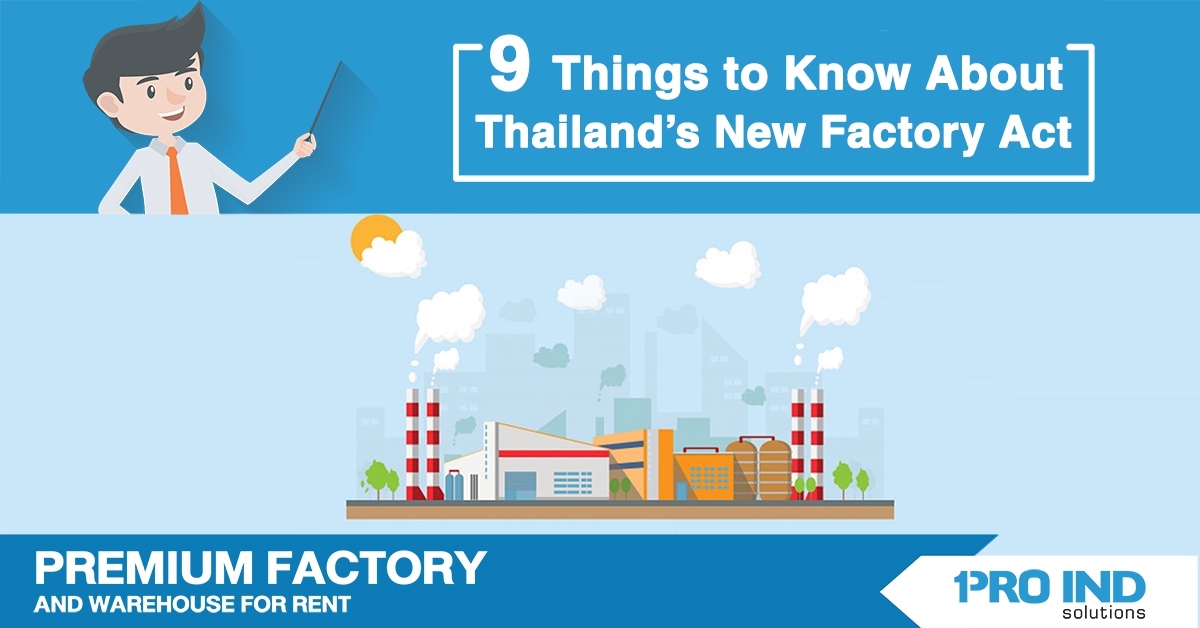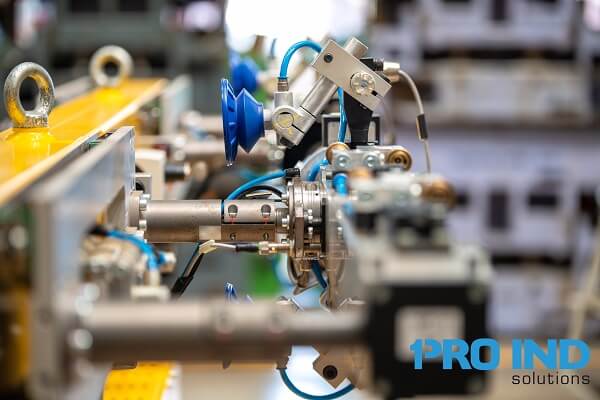9 Things to Know About Thailand New Factory Act

8 Things to Know About the Revised Thailand Factory Act
The new Factory Act came into effect on October 27th, 2019. The government encouraged investment in the industrial sector, whereby the government made adjustments in the Factory Act. These adjustments intend to support new factory establishments in Thailand and help existing factories adjust to shifting markets more swiftly.
Furthermore, these adjustments aim to make the Factory Act more streamlined with current business environments and to speed up the application processes. Primarily, these adjustments encourage more investments in the industrial sector, which is one of the key areas in Thailand's economy. In this article, we have summarized the essence of this law and picked nine vital points to examine.

1. The main objective of this Act
The main aim of this Act is to make the factory applications more lucid and convenient for factory owners. This Act is beneficial to both small and medium enterprises (SMEs) as well as large factory operations because it helps business owners to operate and adjust their factories more rapidly. Nevertheless, this new Act still caters to people and the environment the same protections. The government enacts identical supervisions and regulations on factory operations.
2. What constitutes a "Factory."

The new Factory Act changed what constitutes a "factory." Initially, a factory must have at least five horsepowers or seven workers to be considered a factory. With the current amendment, however, a factory needs to have fifty machine horsepowers or more than fifty staff.
In essence, under the new Factory Act, a factory with fewer machine horsepowers or a smaller workforce does not have to apply for the Factory license.
3. Renewal of the existing Factory License (Ror.Ngor. 4)
Under the original Factory Act, business operators must renew their factory licenses (Ror.Ngor.4) every five years. This procedure allowed the government agency to monitor, update, and access machines within the factories.
However, with the new Factory Act, factory owners do not have to renew their licenses(when they use their existing machines). The government aims to make the process more convenient for factory owners. Obviously, for factories that have new machines, they still have to update their machinery list and renew their licenses.
4. Private Inspectors

Previously, the government officials from the Ministry of Industry would come, inspect, and evaluate the factories. The evaluation process was done entirely by government officials.
Currently, the government aims to speed up this cumbersome process, and thus decentralizes this evaluation process by permitting certified private inspectors to evaluate the premises. The external inspectors, who have obtained certifications from the Department of Industry.
5. The Qualifications of Private Inspectors.
The private inspectors must be qualified members in engineering, science, or technology fields. They need to have at least five years of work experience in jobs related to environmental, safety, chemical, electrical, energy, mechanical, civil engineering, or other related industries. Moreover, they have to receive training courses from the Ministry of Industry before they can become qualified inspectors.
6. The factory entrepreneurs have the legal
Under the present Factory Act, business owners have to obtain a factory license when their machine horsepowers or staff members exceed the minimum amounts. They have the legal obligations to self-declare and apply for the necessary licenses within a specified period (generally before their factory operations).
7. Protection for People and Environment
Although there are extensive changes within the new Factory Act, the government still provides equal protection for people and the environment. Regardless of the amendments in the new Act, the government preserves its quality standard.
8. When will the new Factory Act come into effect?
The new Factory Act would be active within 180 days after the official Royal Government Gazette on April 30th, 2019. Thus, it came in effect on October 27th, 2019.
For factory entrepreneurs who had already received licenses before October 27th, 2019, they could perpetually use the original license.
For further information, please follow the clip below, which entails thorough explanations on the amendments within the new Factory Act as well as the government's initiative-Factory 4.0.
In summary, the enforcement of this new Factory Act should help entrepreneurs to be more competitive and more streamlined in the manufacturing sector. This new Act should bolster better productivity and competitiveness in Thailand's factory operations, and ultimately benefits the country's economy
For further information on the subject, please follow the links below:
https://www.jetro.go.jp/ext_images/thailand/e_activity/pdf/FactoryAct_02_2562.pdf (in English)
If you are interested in renting a high-quality factory or warehouses in Thailand, please feel free to contact us anytime. Our properties have complete functions, and they are in excellent locations. Plus, we support our customers with free repair services throughout the leases as well as a full range of customer support services. Our projects have high-security systems with 24-hour security guards, and CCTVs.
Sources:
https://www.jetro.go.jp/ext_images/thailand/e_activity/pdf/FactoryAct_02_2562.pdf
You might also like.
- There are 8 Convincing Advantages of Renting a Factory or a Warehouse. When entrepreneurs establish their businesses or expand their operations, choosing the appropriate factory o...
- 8 Things to Consider in a Factory and Warehouse Rental Contract in Thailand Factory rental and Warehouse rental have become a prominent choice for business people today. Because of...
- Five innovations that PRO IND factories and warehouses for rent use for heat prevention. Global warming is getting worse every year, and Thailand is greatly affected. It has advers...
- There are 5 essential reasons why we should focus on heat prevention inside the factory and warehouse. The hot weather in Thailand does not seem to lessen. From statistics, the te...
- Five reasons examine why the Samut Prakan province did not flood when Thailand's Big Flood in 2011 occurred. When there was a big flood in 2011, Samut Prakan Province was virtual...
- 5 reasons why renting a factory or a warehouse in the Bangna-Trat area is an excellent idea for conducting your business in Thailand. Many people may wonder why they should rent fa...
- 4 Taxes Related to Factory Rentals and Warehouse Rental Currently, many entrepreneurs and business people are renting factories and warehouses for their business operations because...
- 6 Advantages of Setting up your Factory and Warehouse in Samut Prakan When deciding on the area to base your factory or warehouse, surely, Samut Prakarn would come up as one of the...
- 6 Factors in Choosing an Ideal Rental Factory or Warehouse for Your Business. We present six vital factors in determining the right factory or warehouse for your business. Picking ...
- 6 Things to Know about Establishing a GMP Food Factory in Thailand There are strict rules and standards imposed by the government and relevant authorities to adhere to the quality ...
- The Difference between 3-Phase Factory Electricity and 1-Phase Ordinary Electricity What is the difference between 3-phase and 1-phase electrical systems? Which model is suitable f...
- 5 Things you should Know Before Renting your First Warehouse. As your business prospers, you need substantial space to store your products and raw materials. Selecting your first w...
- 10 Features of Excellent Rental Factory and Warehouse Layouts Factory and warehouse layouts are critical to entrepreneurs and business owners' successes in their production. Rentin...
- 6 Advantages of uPVC Windows and Doors for Factory and Warehouse Many customers, who have visited our factory-and-warehouse-rental projects, are delighted with the quality of our d...
- 5 Typical Scams in Factory and Warehouse Rentals Recently, entrepreneurs and business owners are preferring to rent factories and warehouses rather than owning these properties the...
- 3 Benefits of Epoxy Floor Coatings for Factory and Warehouse. Epoxy floor coating is a synthetic rubber that is produced by the chemical reaction between Epoxy and Polyamine combin...
- 10 Effective Ways to Prevent Factory and Warehouse Fires The warehouse and factory buildings are essential to all types of operating businesses. Frequently, they are the businesses...
- 5 Practical Ways to Save Energy in your Rental Factory and Warehouse Modernized factories and warehouses nowadays are undergoing a drastic change: many factories and warehouses are...
- 7 Insights on Lean Management to Reduce Costs and Increase Profit for Factory Operators The lean system (LEAN) is an ideal practice for factory operations. It helps decrease avoida...
- 4 Advantages of PU Roofs for Rental Factory and Warehouse PU Foam insulation is an excellent material for omitting heat transfer into our rental factory and warehouse areas. It com...
- Key Points on Thailand's BOI: Clear Implications for Factory and Warehouse Operators Board of Investment of Thailand (BOI) has the core responsibility in promoting foreign direct i...
- 7 Benefits of Aluminum Composite, and Because of these Reasons, We use it for our Rental Warehouses and Factories. Presently, in the construction materials sector, we frequently no...
- 8 Significant Expenses Related to a Factory and Warehouse Rental in Thailand Renting a factory or a warehouse when you establish your company in a new country is a vital step in yo...
- 8 Questions to Ask When Choosing Warehouse for Rent in Thailand Selecting a suitable warehouse rental is imperative to business success. The current business landscape demands stra...
- Thailand’s Various Rental Warehouse Types and their Purposes This article would distinguish the various warehouse for rent types in Thailand. We can identify a warehouse facility a...
- 4 Safety Dimensions for Factory and Warehouse Operations In successful industrial enterprises, there are many factors that entrepreneurs and plant operators need to consider. Safet...
- Warehouse Management Techniques. How to Practice Warehousing Activities Efficiently for your Business? In manufacturing businesses, warehousing creates substantial financial impact...
- 5 Factors to Consider when Renting a Factory or Warehouse in Thailand Selecting a high-quality rental warehouse or factory is a fundamental step in a successful business establishm...
- 4 Necessary Steps for your Factory and Warehouse Relocation Factory and warehouse rentals have become the current viable choice for business operators because this choice offers ma...
- 5 Things to know about Thailand’s Cold StorageWarehouse for Rent A cold storage warehouse is a warehouse that controls the temperature in the storage area, and the appropriate temp...
- 5 Negotiation Tips for Thailand’s Factory and Warehouse Rental Contracts Selecting a factory and warehouse for rent is an integral part of your business success. In Thailand, succe...
- What are the Similarities and Differences Between the GMP and HACCP Standards in a Factory in Thailand? Two crucial, global standards for food manufacturers are the GMP and HACCP s...
- 7 Things to Know about Establishing a HACCP Manufacturing Facility in Thailand The HACCP system stands for Hazard Analysis and Critical Control Point System. Food production employ...
- 6 Highlights on Thailand’s Factory Clean Rooms Cleanrooms are an essential part of manufacturing sites, which demands high levels of cleanliness. The cleanrooms enable your product...
- 4 Insights on Thailand’s Bonded Warehouse Currently, rental bonded warehouses in Thailand have gained much popularity among business people. Bonded warehouses are especially useful...
- 3 steps to rent a factory and warehouse in Thailand and everything you should know to help you prepare when looking for factories for rent and warehouses for rent. Nowadays, factor...
- 7 crucial factors in choosing a factory and warehouse location in Thailand 7 crucial factors in selecting a rentalwarehouseor factory location in Thailand. This article is relevant...
- 5 things you need to know when choosing a factory for rent and a warehouse for rent in Thailand Quality factories or warehouses for rent can boost the tenant's company image and cr...
- 7 Advantages of Renting Warehouses in Pro Ind Warehouse Park 4 Project Renting a warehouse is a crucial step in managing business inventory, whether for small or large businesses....
- 8 Special Services When Renting a Factory, or Warehouse with Pro Ind Solutions Co., Ltd. At Pro Ind Solutions Co., Ltd., we prioritize the quality of our rental factories, and our ...
- 6 Advantages of Renting an Elevated Warehouse for Rent Choosing an efficient warehouse for rent is a crucial factor that significantly impacts the success of business operations to...



.png)
.png)

